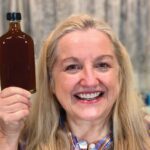Medicinal Herbal Syrups Master Recipe
Learn how to make medicinal herbal syrups using any herb with this master recipe that allows you to tailor the syrup to your exact needs. For example, using this Master Recipe, you can make a thyme herbal syrup that may help soothe a sore throat and a cough.
Servings: 144 teaspoons
Equipment
- 1 Medium-sized saucepan
- 1 Wooden spoon
- 1 Kitchen twine
- 1 Flour sack towel, cheesecloth, or coffee filter
- 1 Large glass bottle, preferably amber colored
Ingredients
- 4-6 cups Water Less water will create a stronger syrup, while more water will create a weaker syrup. In my recipe video, I used 4 cups of water.
- 1 ounce Dried edible herbs of choice 1 ounce of a fine herb, such as thyme, will measure 1 cup. 1 ounce of a more bulky herb, such as dried chamomile flowers, will measure 1 1/2 cups. In my recipe video, I used 1 cup of thyme, specifically lemon thyme.
- 1-3 cups Sweetener You will want to use a whole sweetener, such as honey, maple sugar or syrup, coconut sugar or syrup, sucanat, etc. You can also use white sugar. Do not use artificial or alternative sweeteners, such as stevia. In my recipe video, I use 1 cup of honey.
Instructions
- Pour water into a saucepan and bring to a boil on a stovetop burner.
- Once the water comes to a boil, turn the heat down to a medium simmer and add herbs. Stir well to completely saturate the herbs.
- Using the handle of a wooden spoon, submerge it into the saucepan mixture and then remove it. Note the waterline. (See video.)
- Using kitchen twine, tie a piece of the twine at the halfway point of the waterline. Set aside.
- Allow the water and herb mixture to decrease by half. This can take approximately 15 minutes. Use the wooden spoon with the twine to measure the halfway evaporation. (See video.)
- Once the mixture has decreased by half, place a mesh strainer over a bowl and strain the herbs from the liquid.
- If there is significant herbal debris in the liquid, re-strain it one more time by lining a mesh strainer with a flour sack towel, cheesecloth, or coffee filters. Pour the liquid through the lined mesh strainer placed over a bowl.
- Now, it is time to sweeten the liquid. There are two ways to do this.
- Sweetener Option 1 - If you are using a liquid sweetener, such as honey or maple syrup, you will simply add the desired amount to the warm liquid in the bowl and stir well until the sweetener has completely dissolved.
- Sweetener Option 2 - If you are using a granulated sweetener like sucanat, maple sugar, or white sugar, you will need to pour the liquid into a clean saucepan placed on a stovetop burner and then add the desired sweetener to the liquid in the saucepan. Turn the stovetop burner to low and stir the mixture until the granulated sweetener has completely dissolved.
- Once sweetened, the herbal syrup is ready to be decanted. If possible, decant this syrup into an amber-colored glass bottle and then refrigerate it. This herbal syrup will stay potent for approximately one year.
- The dosage depends on what type of herbal syrup you made and what symptoms you are experiencing. Consult an authoritative source for more information on this topic, including any book written by Rosemary Gladstar. Also, see the Recipe Notes below for additional information.
Video
Notes
Herbs: Measuring dried herbs is not an exact science. However, I have provided some basic guidelines in this recipe. If you are ever unsure about your measurements, simply error on the side of being more generous when using mild herbs, such as chamomile, and less generous when using strong or pungent herbs, such as rosemary.
And when using strong or pungent herbs, it is best to temper their strong flavor by mixing them with other herbs that are complimentary and meet your specific needs.
You can make herbal syrups using a combination of herbs, as well spices and aromatics. For example, using this Master Recipe, I made a thyme herbal syrup that may help soothe a sore throat and a cough. To add additional healing properties to this syrup, you could also add one sliced onion and an inch of sliced ginger to the thyme while it is simmering in the saucepan.
Sweetener: How much sweetener you add depends on personal taste. Traditionally the ratio is one to one, but I find this rather sweet, so if I have two cups of liquid, I generally only add one cup of sweetener. (See video.)
Disclaimer: I am not a medical doctor, a medical professional, a dietician, or a nutritionist. All content found on the MarysNest.com website, YouTube Channel, emails, and related social media, including text, images, videos, or other formats, were created solely for informational purposes only. The content is not intended to be a substitute for professional medical advice, diagnosis, or treatment. Always seek the advice of your physician or other qualified healthcare provider with any questions you may have regarding a medical condition or proper nutritional advice. Never disregard professional medical advice or delay in seeking it because of something you have watched on this video or read on the corresponding website. Use caution when following the recipes in the emails, videos, or website. The creator and publisher of the emails, videos, and website will not be held responsible for any adverse effects that may arise from the use of the recipes and methods in the emails, video channel, or corresponding website.
Find this recipe and video at https://marysnest.com/how-to-make-medicinal-herbal-syrups-using-any-herb/
Copyright © 2022 Mary's Nest, LLC, All Rights Reserved
